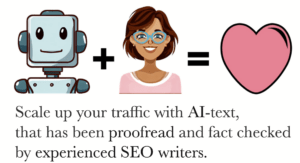In today’s digital age, artificial intelligence (AI) is revolutionizing the way we measure and analyze content effectiveness. From understanding user engagement to optimizing marketing strategies, AI tools are becoming indispensable for creators and marketers alike.
They’re not just crunching numbers; they’re providing insights that were once beyond human reach, transforming raw data into actionable intelligence.
This article explores how AI is used in content measurement, the benefits it brings, and the challenges it poses, offering a glimpse into the future of digital content strategy powered by smart technology.
Importance of AI in Content Measurement
AI significantly enhances how content effectiveness is measured, providing you with precise, real-time insights. You’re no longer guessing what works; AI tools offer clear metrics on engagement and reach, tailoring your strategies to what truly resonates with your audience. This isn’t just about numbers; it’s about understanding user behavior and preferences more deeply than ever before.
With AI, you’re equipped to make informed decisions quickly. Adjustments to your content can be made on the fly, ensuring your material stays relevant and impactful. This adaptability is crucial in a digital landscape where trends and audience interests can shift rapidly. Essentially, AI doesn’t just track success—it helps you stay ahead, making your content strategy dynamic and responsive.
AI-Powered Data Analysis Techniques
AI-powered data analysis techniques transform how you understand and utilize audience interactions by breaking down complex datasets into actionable insights. These tools leverage advanced algorithms to sift through vast amounts of data, identifying patterns and trends that would be impossible for you to detect manually. You’ll find that AI can predict user behaviour, segment audiences more effectively, and provide a deeper understanding of content engagement.
By harnessing these capabilities, you’re equipped to make data-driven decisions swiftly and accurately. This isn’t just about processing information; it’s about transforming that information into a strategic asset. You’ll notice improvements in how you target and tailor your content strategies, ensuring that each decision is backed by reliable, comprehensive data analysis.
Enhancing Content Performance with AI
AI tools significantly enhance your content’s performance by optimizing engagement strategies and personalizing user experiences. They analyze vast datasets to identify what resonates most with your audience, tailoring content to suit their preferences. This targeted approach ensures that your material is not only relevant but also compelling, vastly improving engagement rates.
Moreover, AI-driven systems automate the optimization of content delivery times and formats, ensuring that your messages reach your audience when they’re most receptive. By streamlining these processes, you’re freed up to focus more on creative aspects, while AI handles the analytical heavy lifting.
This synergy between human creativity and machine precision creates a dynamic framework that propels your content’s effectiveness to new heights.
Predictive Analytics for Content Strategy
Predictive analytics revolutionizes your content strategy by forecasting trends and audience behaviours, enabling you to stay ahead of the curve. By analyzing past data, you’ll identify which topics capture interest and predict what your audience will crave next. This isn’t just about following trends; it’s about creating content that resonates on a deeper level.
You’ll also gauge the optimal times for content, enhancing engagement. It’s not about guessing anymore; you’re equipped to make informed decisions that align with your strategic goals.
Imagine tailoring your content to meet the anticipated needs and interests of your audience, ensuring that every piece has maximum impact. This proactive approach not only boosts your relevance but also strengthens your position as a thought leader in your niche.
AI Tools for Content Optimization
AI tools streamline your content optimization process, ensuring each piece is crafted for maximum engagement. They analyze keyword trends and suggest optimizations that’ll resonate with your audience, enhancing readability and SEO performance. You’ll find these tools indispensable for tailoring content to user preferences and search engine algorithms.
Moreover, AI-driven software can automate A/B testing, allowing you to compare different content versions quickly. This capability helps you pinpoint the most effective elements like headlines, images, and call-to-action phrases.
By integrating AI tools, you’re not just guessing what works; you’re deploying data-backed strategies that significantly lift your content’s effectiveness. They ensure you’re always ahead of the curve, adapting to evolving digital landscapes with precision.
Measuring Content ROI Using AI
AI technologies empower you to accurately measure your content’s return on investment (ROI), transforming raw data into actionable insights. By leveraging machine learning algorithms, you can predict which types of content generate the most revenue or engagement and adjust your strategy accordingly. This means you’re not just guessing what works; you’re using hard data to make informed decisions.
Moreover, AI helps you identify patterns and trends in your content’s performance across different platforms. You’ll see which topics or formats consistently perform well, allowing you to tailor your future content to meet these successful metrics.
It’s not just about counting clicks; it’s about understanding why something was effective and how you can replicate that success.
Real-time Insights through AI
AI tools provide you with real-time insights, enabling immediate adjustments to your content strategy. As you analyze your campaign, AI quickly identifies which parts are resonating with your audience and which aren’t. This means you can tweak your approach on the fly, focusing more on what works and less on what doesn’t.
You’ll see which topics capture attention and which formats deliver the best engagement. This instant feedback loop helps you optimize content efficiently, without waiting for end-of-campaign reports.
Imagine adjusting your strategies based on live data, ensuring your resources are always well-spent. AI doesn’t just track trends; it offers a roadmap for dynamic, effective content and creation tailored to your audience’s evolving interests.
Future Trends in AI for Content Analysis
Looking ahead, AI is set to revolutionize content analysis by predicting trends and personalizing user experiences more accurately than ever before. You’ll see AI systems that not only understand but also anticipate the content you crave, adapting in real-time to your evolving preferences.
Imagine algorithms that sift through vast amounts of data to forecast viral topics, allowing content creators to stay ahead of the curve. These innovations won’t just enhance how content is tailored; they’ll transform engagement metrics, making them more intuitive and actionable.
You’re entering an era where content effectiveness isn’t just measured, but predicted, offering you insights that were previously unimaginable. Keep your eyes peeled; the future of content analysis is smarter and more connected.
How does AI differentiate between high-quality content and low-quality content in terms of engagement metrics?
To determine content quality based on engagement metrics, AI analyzes factors like user interactions, time spent on page, and social shares.
It uses algorithms to assess patterns and trends, distinguishing high-quality content from low-quality content effectively.
What ethical considerations should be made when using AI to analyze user-generated content?
When using AI to analyze user-generated content, consider privacy, bias, and transparency.
Ensure ethical guidelines are followed to protect user rights, prevent discrimination, and maintain trust in the content evaluation process.
Can AI tools help in predicting future trends in content consumption based on current data?
Yes, AI tools can assist in predicting future content consumption trends by analyzing current data patterns.
They provide valuable insights that help in forecasting upcoming trends and optimizing content strategies for better engagement.
Conclusion
In conclusion, AI plays a crucial role in content measurement by providing valuable insights, improving accuracy, and increasing efficiency.
With AI technology constantly evolving, businesses can leverage its capabilities to enhance their content strategies and achieve better results.
Embracing AI in content measurement is essential for staying competitive in the digital landscape and meeting the demands of today’s data-driven world.
Stay ahead by integrating AI into your content measurement processes for continued success and growth.





